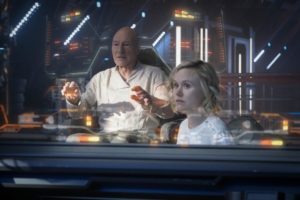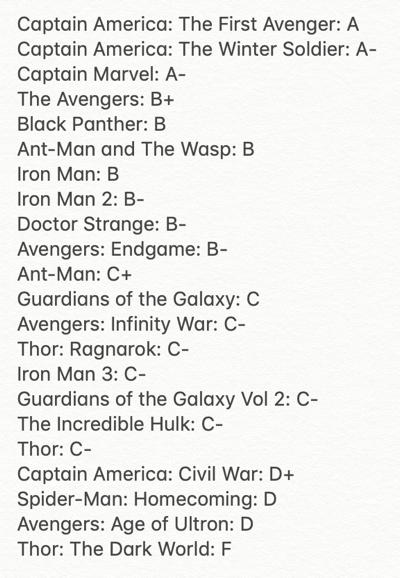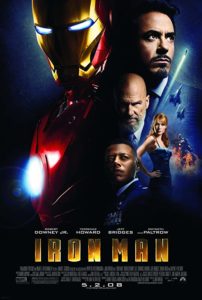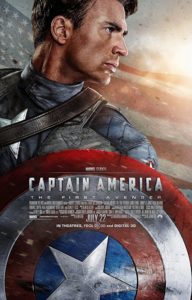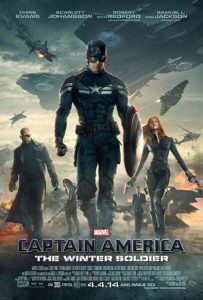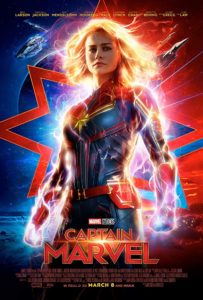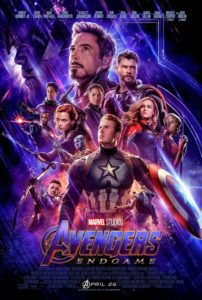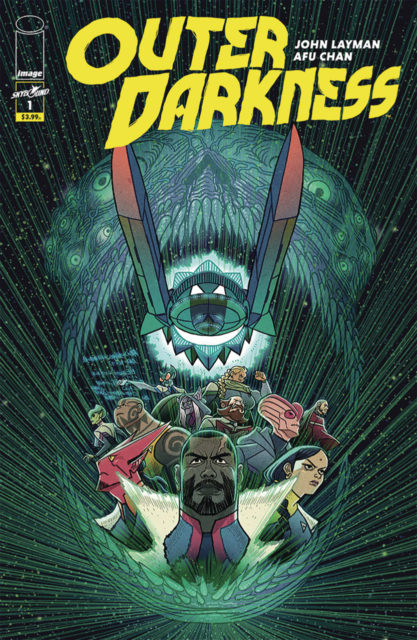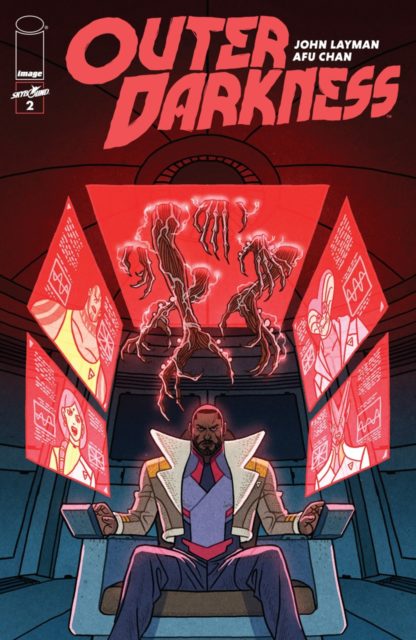Now that I’ve seen Avengers: Endgame and I’m all caught up on them, I thought I’d survey all of the films in the Marvel Cinematic Universe.
Endgame marks the end of the 22 films which Marvel claims are collectively titled “The Infinity Saga”, though I think that’s meant to sound more impressive than it is: The films are linked, to be sure, but the link is for some films pretty tenuous, and the overall story certainly could have been condensed down to no more than six movies as there’s a lot of material superfluous to what one might call the main story.
Still, despite this posturing, it’s been an enjoyable run, albeit with its ups and downs..
To start with, I put together a ranking of all of the films, with letter grades. There are some I might move up a little or down a little depending on my mood – especially the ones in the C range which are all very similar in quality – but in the large here’s where I put them:
And now I’ll briefly – and chronologically – run through all of the films with some expanded thoughts on them.
Spoilers ahoy!
Iron Man (2008) and Iron Man 2 (2010)
I didn’t see these when they first came out – I didn’t see them until after The Avengers – and I wrote a joint review of them. It’s hard not to think of them as linked, since they’re very similar films. Iron Man has better character bits but a disappointing finale (“hero runs out of power but triumphs anyway” is never a satisfying finish), while Iron Man 2 has a lot of dead air leading up to a much more satisfying climax. Both films hold up pretty well today, and it’s really hard to say which one I like more. Their biggest weakness is that Tony’s friends can’t convincingly stand up to him (Nick Fury’s appearance in Iron Man 2 is a breath of fresh air in this regard), and so the story often feels like it’s a man’s internal struggles made external, but kind of ham-fistedly so. Unfortunately, the MCU never did learn to apply nuance to Tony’s character or struggles.
The Incredible Hulk (2008)
Not a sequel to the 2003 film Hulk (which I haven’t seen), this one is only tenuously connected to the rest of the series. Edward Norton does a terrific version of Bill Bixby’s Bruce (David) Banner from the 1970s TV series, reinforced by the opening credits which seems to recreate the origin from that series. (Apparently they filmed 70 minutes worth of origin footage! Then wisely decided to just use it as credits visuals.) The movie plays more like a horror film than a superhero film, and its best scene is the army facing the Hulk on a college campus, which is perhaps the single most effective scene for showing what a completely terrifying experience the Hulk would really be. The film is majorly let down by its special effects, which would have seemed dated 5 years earlier when The Lord of the Rings finished its trilogy. The story is kind of dumb and since there never was a sequel one of the major loose ends never gets resolved, but there is lots of smashing.
Thor (2011)
Somehow directed by Kenneth Branagh and featuring a fantastic cast, Thor is unfortunately a rather tedious film due to a by-the-numbers story of Thor learning responsibility and how to (sometimes) see through his brother Loki’s machinations. Chris Hemsworth made the role of Thor his own, but is overshadowed by Tom Hiddleston’s Loki. The film only has one truly great scene, where Thor gets his hammer back and faces the Destroyer.
Captain America: The First Avenger (2011)
The first MCU film I saw in the theater, you can read my full review from that time. I thoroughly enjoyed this film and it holds up wonderfully. Chris Evans is picture-perfect as Cap, making him more than a naive do-gooder, convincing us that he has deep-seated beliefs motivating his actions. His conversations with Erskine are both amusing and moving. The moment when Cap and Bucky and the soldiers walk back into camp after Cap rescues them is the single best scene in any film in this list. Even the ending works perfectly – although it maybe works a little better after seeing the later films since it makes it not quite so bittersweet.
The Avengers (2012)
I saw this one in the theater too, and here’s my review. The Avengers holds up better than I would have guessed at the time: The wheel-spinning plot of act two works a bit better as character-building now that we have a better idea of what characters were built. Joss Whedon’s cutesy dialogue hasn’t aged as well, nor has his ham-handed scripting of the Black Widow. And then the whole point of the invasion is questionable given what we know from Infinity War and Endgame (why does Thanos bother with all of this?). But there are several great scenes, and the whole final battle is the gold standard for staging a complex superhero fight. Mark Ruffalo’s Bruce Banner is very different from Edward Norton’s, but it works well for how his character develops. But the film really belongs to Cap and Iron Man as the big two of the MCU.
Iron Man 3 (2013)
Many people hate this film. I’m not going to die on a hill defending it, but I think it’s better than some think. The film works with an interesting premise: What can Tony Stark do if he can’t be Iron Man? And there are some fun scenes built around that, (very) loosely inspired by a few similar moments from some comic books. The rescue of the President’s aides is pretty great, too. But the story overall is a mess, the Mandarin is a tremendous disappointment (they got Ben Kingsley and wasted him on this?), and the final battle is a lot of flash but is basically kind of silly.
Thor: The Dark World (2013)
Award winner in the category of “most criminal underuse of Christopher Eccleston” right here. The Dark World is incomprehensible nonsense almost from start to finish, punctuated by cringeworthy scenes that I guess are supposed to be funny (especially those involving Erik Selvig). The scene where Thor and Loki put one over on Malekith is pretty good, but otherwise this one has nothing to contribute to the series except another Infinity Stone.
Captain America: The Winter Soldier (2014)
The first two Captain America films are neck-and-neck as my favorite superhero films, but when pressed I think the first one is just a little bit better. Still, I loved The Winter Soldier, as I wrote in my original review. While the high-level story involving “the algorithm” and the plot device “we must put our chip in all three carriers or it’s all for naught” is basically ridiculous, the story works very well the rest of the way, especially the sense of paranoia Hydra engenders, and the sheer hopelessness Cap feels when confronting Bucky. Black Widow gets her best characterization here, and it feels like the directors brought a great performance out of Scarlett Johansson where Joss Whedon couldn’t. Anthony Mackie is immediately terrific as the Falcon. Finally, the action scenes are amazing, like The Matrix on caffeine and speed.
My biggest regret in this film is that they planted several seeds of future Cap movies (Bucky, Sharon Carter, Nick Fury going walkabout) which got sacrificed on the altar of Age of Ultron and Civil War, and frankly it just wasn’t worth it.
Guardians of the Galaxy (2014)
Some people love this film, thinking it’s in the upper echelon of the series. I think it’s practically the epitome of an average action film, with a cardboard villain, a lot of fine action scenes, heavy on the humor, and a pretty standard story arc. The emotional center of the film – Quill and Gamora – suffers a lot in that I think Zoe Saldana is a pretty wooden actress. By contrast Bradley Cooper’s Rocket – despite being a voice actor over a CGI raccoon – is the most sympathetic and engaging of the characters. I’m reasonably happy to watch this when it comes on TV and I want something on in the background, but it’s not going to displace a Red Sox game.
Avengers: Age of Ultron (2015)
Things start to go wrong here, and I’m not sure whether it’s because of Joss Whedon’s script and direction, or if it’s instructions from higher up about where the characters should go which gets in the way. Ultron is an embarrassingly dumb villain – quite a change from his comics persona where he’s one of the five scariest villains in the Marvel Universe – and there are just too many characters here with too much running around, complete with a second-act fight which is even more pointless than in the first movie, as much fun as it might be to see the Hulk run crazy. The Vision is tragically underused in this film and in later ones. At best this film is moving the chess pieces around for later films, but it’s not a fun experience. It also suffers from not having Alan Silvestri score the music as he did for the other Avengers films.
Ant-Man (2015)
A charming little caper film, Paul Rudd and Michael Douglas are both at the top of their games in this film about a retired hero (a contemporary of Howard Stark) recruiting a small-time thief to help take back his company. For comics fans it’s a fun re-mixing of comics elements into the MCU, but it works fine on its own too. The best scenes involve Scott and his daughter Cassie, as Rudd completely sells Scott’s love for his daughter and how that relationship guides him when it really matters.
Captain America: Civil War (2016)
And here’s where the wheels fall off on the overall story. First of all, this should have been the third Avengers film because it’s not really a Cap film. Second, it cements Tony Stark’s place as the greatest villain of the MCU (well okay, maybe Thanos passes him later on, in results if nothing else). It’s a nice introduction for the Black Panther, who’s the only character who comes out of this having gone anywhere, but they could have accomplished that in a much narrowed Cap film which also developed his relationship with Bucky reasonably. Turning Tony into a man-child and basically undoing all of his earlier character development was just awful. It’s always fun to see Chris Evans as Cap, but he deserved a lot better than this.
Doctor Strange (2016)
It’s decidedly weird to see Benedict Cumberbatch with an American accent, but that aside he was quite well cast as Doctor Strange, who has his own personal hubris and downfall to overcome, not entirely unlike that of Tony Stark, albeit with a more transformational result. I didn’t completely buy that Strange had truly become the “master of the mystic arts” by the end of the film, but it was close enough. I also appreciated that they didn’t go “the full Ditko” with the CGI dreamscapes. There are a lot of directions they can take Doc in future films, and I hope they choose the “sorcerer supreme” direction rather than the “loses his powers and has to soldier on somehow” direction.
Guardians of the Galaxy vol 2 (2017)
It seems like big fans of the first Guardians film felt this was a disappointment, but I think it’s only a small step down. I’m not sure whether they could have come up with a truly satisfying reveal for Quill’s father, and this was a pretty good try. It’s his relationship with Yondu which works best, though. Nebula and Gamora’s reconciliation works pretty well too.
Spider-Man: Homecoming (2017)
I’m probably in the minority here, but I did not like this film. I thought Tom Holland was fine as Peter Parker and great as Spider-Man, and the fight scenes were excellent. But the high school scenes were painfully awkward, Tony Stark’s patronizing lack of trust in Peter is another big strike against his character, and Peter’s desperate attempts to make a difference early in the film are both cringeworthy and feel very out-of-character for him. Spider-Man’s character works best as a young man who’s responsible beyond his years, and while they’re trying to make him a more fallible hero, I don’t think they thread that needle. I haven’t seen most of the earlier Spider-Man films, but I’d take the first Tobey Maguire one over this one.
Thor: Ragnarok (2017)
Another film that some people adore and which I think is just okay. I appreciated the opening sequence where we see how far Thor has come since his first film, yet we see later that he’s learned some of the wrong lessons, that he’s still a little too full of himself even though he’s much more wise and capable than he once was. The scenes on Sakaar are fairly entertaining, but most of the stuff on Asgard is dull, and the final battle feels pretty disappointing, like there wasn’t really a victory there, yet not much processing of what was lost either. I guess Chris Hemsworth has been enjoying the comic side of his later MCU movies, but I think it’s consistently some of the weakest stuff in them. Kudos to the writers and director for trying some off-the-wall stuff, but it was pretty hit-or-miss overall.
Black Panther (2018)
I don’t think it’s possible for me to like this film as much as some people do, but I do think it’s a good film. The acting is great across-the-board (honestly Martin Freeman is probably the weak link here and he’s still fine), and it represents a new step forward in staging complex battle scenes. That said, T’challa’s character arc straight out of Rocky is a little meh, and the big fight at the end feels a bit too manufactured. I preferred the first half where it was a sort of superhero James Bond film.
Avengers: Infinity War (2018)
A two-and-a-half hour set-up for Endgame, I didn’t see this in the theater and once I saw it I didn’t feel like I missed much. It really has only two great scenes – when Cap and company show up to rescue Vision and the Scarlet Witch, and when Thor arrives to fight Thanos. The film otherwise was just overstuffed with characters, none of whom displayed any real character. The directors have said that Thanos is the film’s protagonist, which explains a lot about why it doesn’t work: His motivations make no sense, he doesn’t grow or change as a character, he’s utterly unsympathetic and is in a way the ultimate generic villain. Not quite as big a flub as Galactus in Fantastic Four: Rise of the Silver Surfer, but up there. The film sort of tried to pay off the tragedy of the Avengers being broken up and unable to work together after Civil War, but it’s a subtheme at best. The best part of the film is Mark Ruffalo as Bruce Banner, who fills the “everyman” role in the story, just kind of amazed at everything going on around him. He gets the single best line in the film, too: “You guys are so screwed!”
Ant-Man and the Wasp (2018)
Another fine caper film, maybe a little better than the original: The villain was more interesting, and the spectacle was more entertaining. The Ant-Man films are not tremendously ambitious, but I don’t think they’re meant to be. If you liked the first one, you should enjoy this one.
Captain Marvel (2019)
I wasn’t sure what to expect going into this film – which I did see on the big screen, and it was worth it – since the comic book version of Captain Marvel has a long and complex backstory which I didn’t see them translating to the MCU. Quite sensibly they kept the bare bones of her origin and jettisoned almost everything else in favor of a new story about a woman on a journey of self-discovery. The film is quite clever with some fun twists and turns and entertaining fight scenes at the end. Brie Larson plays Cap with a mood that switches between intense and ethereal, and though she’s cut from similar cloth as Captain America she comes across very differently from Chris Evans’ aw-shucks Brooklyn demeanor. I’m a little sorry we (probably) won’t get to see them appear together in a significant way.
Anyway, after thinking about it I realized that I enjoyed this film more than any in the series except the first two Captain America films, and I’m eager to see more. I rather hope the next film explores what she’s been doing in space for 25 years before returning to Earth, and why it seems none of the other space-based characters (Thanos, the Guardians) have heard of her, since she’s able to take down a star destroyer without working up a sweat. Figuring out how to challenge a character with that level of power is also going to be a good trick for her future writers.
Avengers: Endgame (2019)
Probably easier for you to just read my full review, since it was just a couple of weeks ago. But in brief it was a much more enjoyable film than Infinity War, with stronger characterization. It would have been nice if the whole third act hadn’t only been an extended fight scene, and I think the ending could have been a bit better, but as a farewell to Chris Evans and Robert Downey Jr. in their superhero roles it was enjoyable enough.
Looking Forward and Backward
What made these movies enjoyable for me is that the core characters were true to their comic book versions, and the stories effectively remixed many comic book elements to create engaging new versions. Sometimes this worked better than other times: Winter Soldier pulled together several disparate comics plots into an enjoyable whole, while Iron Man 3 didn’t really get it. But in the end when we saw the Avengers fighting Loki and his alien army, they were the characters we wanted to see. This isn’t the way superhero movies have to be done – Christopher Nolan demonstrated that in his Batman trilogy – but it was made this series work.
The question is where the series goes from here with Captain America and Iron Man being written out, and Thor probably moving into more of a supporting role (Chris Hemsworth is apparently willing to do more Thor films, but with a more comedic bent). It sure looks like Captain Marvel, Black Panther and Doctor Strange are likely to be the core characters for the next decade or so of films, which is a mix we haven’t really seen in the comics, so we’ll see whether the studio forms them into a new team (the Defenders would be the logical choice if they decide to jettison or merge the Netflix characters into the MCU). But with Disney buying Fox it sounds like the X-Men will be arriving in the MCU soon, and perhaps the Fantastic Four after that. And then there are the rumored TV series (Vision and the Scarlet Witch, Falcon & Winter Soldier) – but I have a hard time seeing them tightly integrate those with the movies, much as Agents of S.H.I.E.L.D. has largely been its own thing separate from the films.
Honestly I hope they move away from trying together all of the movies and instead focus on developing story arcs for each of the major characters, the sort of thing that Captain America was denied.
My guess is that the MCU as currently constructed will probably start to break down when the main stars of the next 5 years start to leave, and then we’ll see Marvel reboot the franchise in new films. That’s not the worst thing – either through hard or soft reboots most of these characters have been changing for new generations over the decades anyway, so a new Cap, Iron Man and Thor for a new generation would make sense.

